
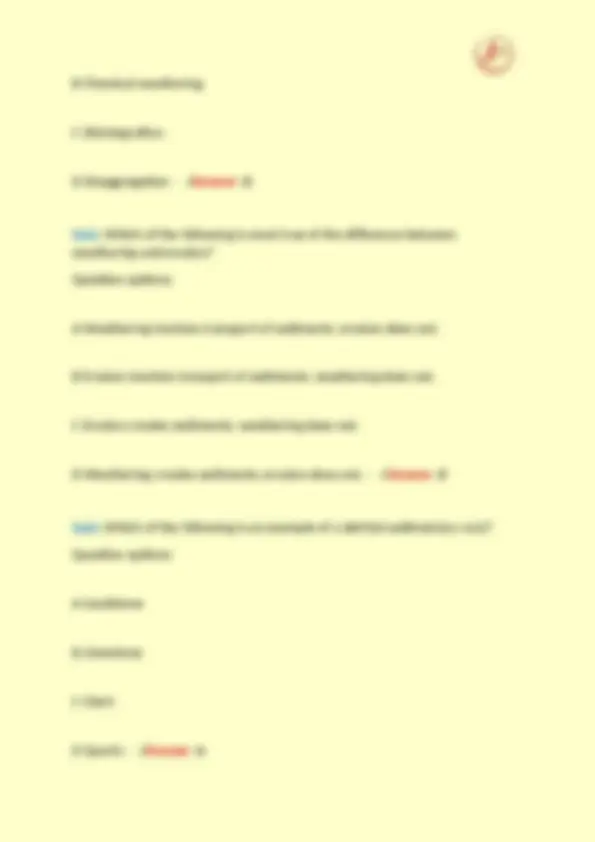
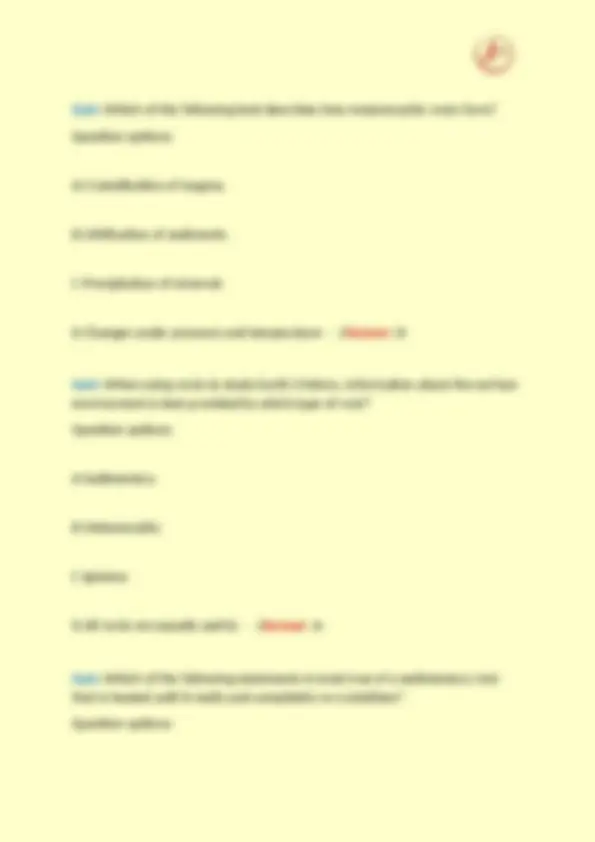
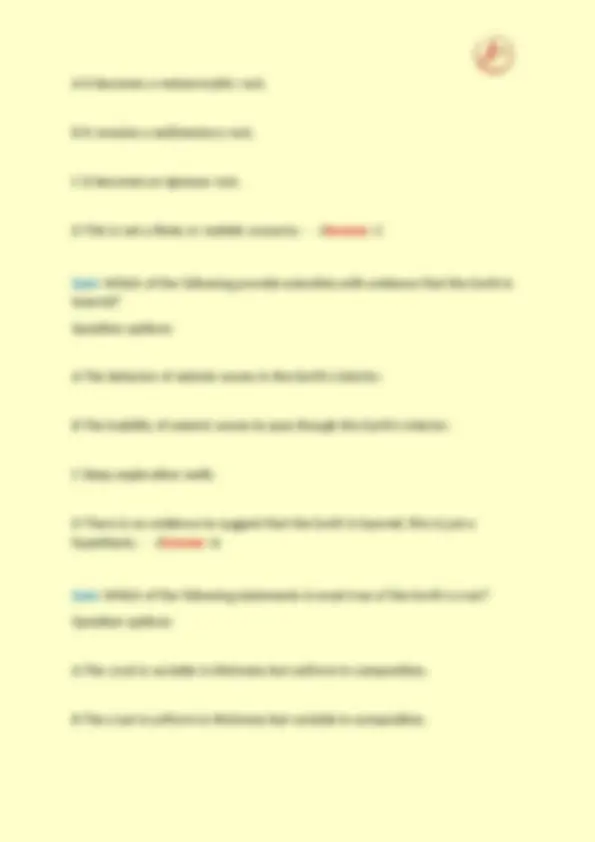
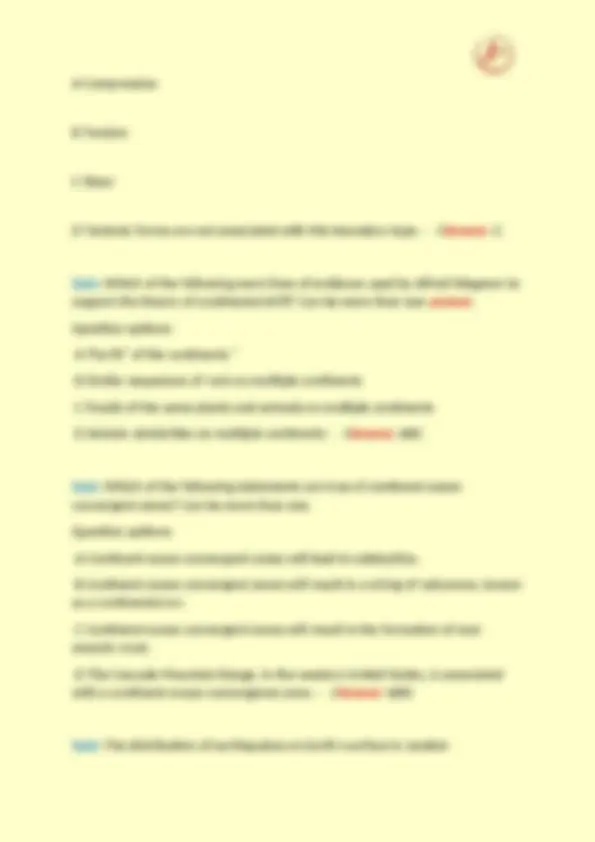
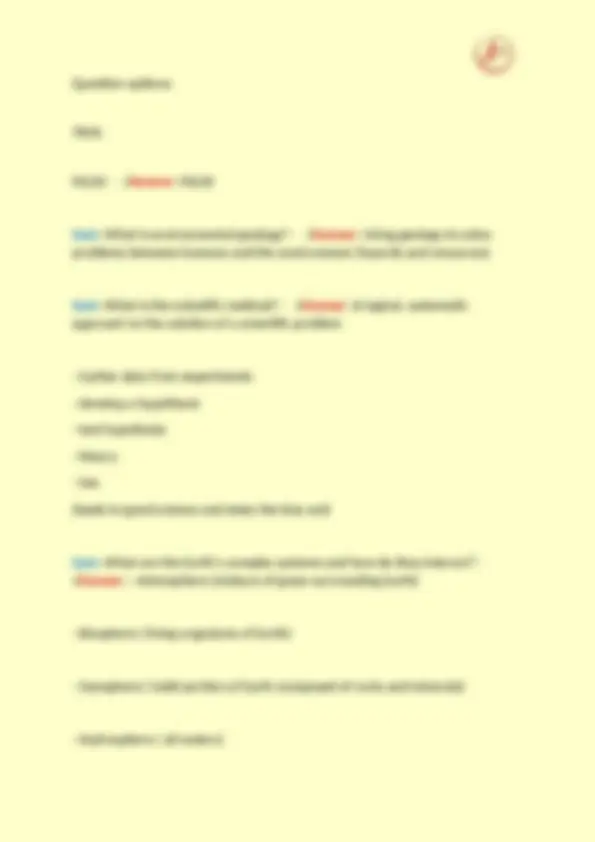
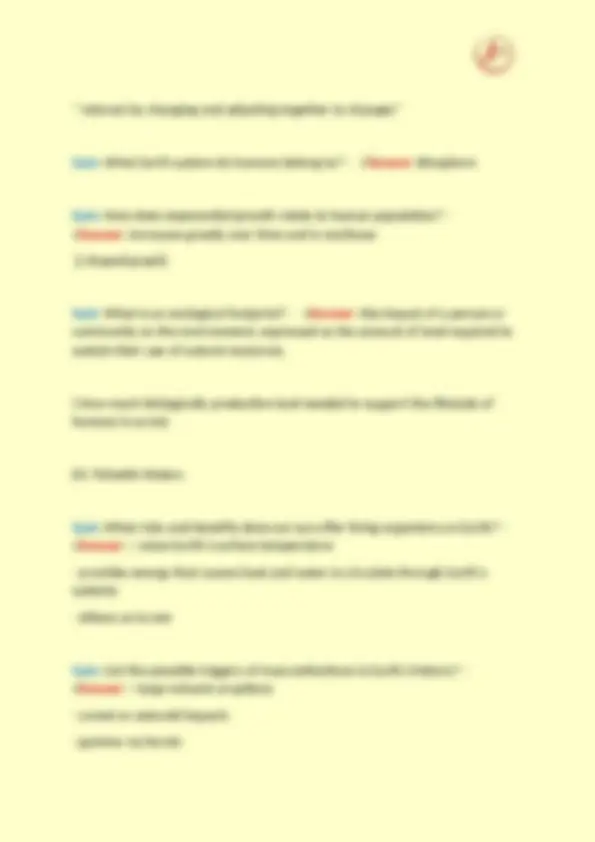
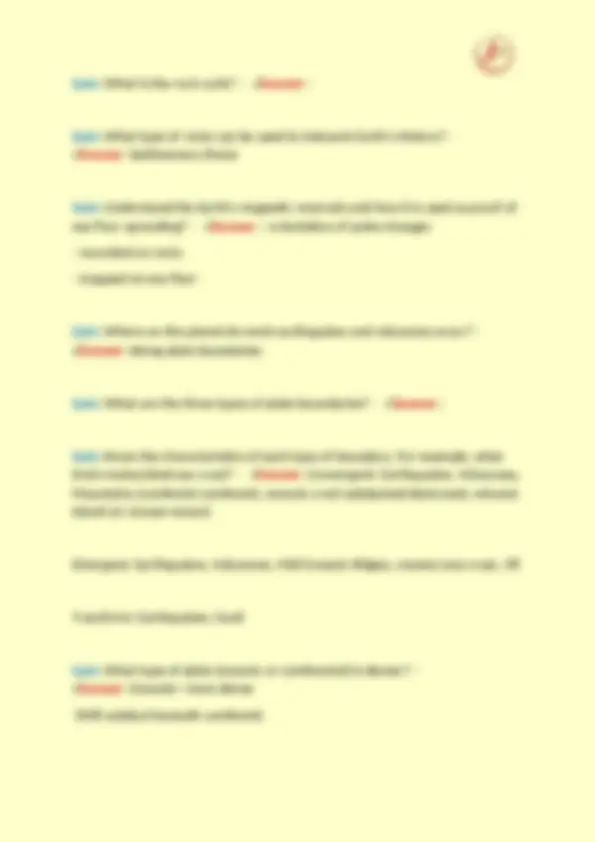



Study with the several resources on Docsity

Earn points by helping other students or get them with a premium plan


Prepare for your exams
Study with the several resources on Docsity

Earn points to download
Earn points by helping other students or get them with a premium plan
Community
Ask the community for help and clear up your study doubts
Discover the best universities in your country according to Docsity users
Free resources
Download our free guides on studying techniques, anxiety management strategies, and thesis advice from Docsity tutors
A quiz or test on various topics related to environmental geology, covering concepts such as the definition of minerals, the classification of igneous, sedimentary, and metamorphic rocks, the rock cycle, plate tectonics, and the earth's complex systems. The quiz includes multiple-choice questions that test the student's understanding of these fundamental geological principles. A comprehensive overview of the key topics in environmental geology and could be useful for students preparing for an exam or test in this subject area.
Typology: Exams
1 / 14

This page cannot be seen from the preview
Don't miss anything!









Quiz :Which of the following is NOT part of the definition of a mineral? Question options: A Minerals are amorphous. B Minerals have an internal crystalline structure. C Minerals have a definite chemical composition. D Minerals are inorganic - √ Answer :A Quiz :Which of the following terms is used to describe an assemblage of one or more types of minerals? Question options: A Rock B Magma C Polymorph D Aggregate - √ Answer :A Quiz :Which of the following statements is true of extrusive igneous rocks? Question options:
A Extrusive igneous rocks cool on the surface and have a course-grained (large mineral crystals) texture. B Extrusive igneous rocks cool beneath the surface and have a fine-grained (small mineral crystals) texture. C Extrusive igneous rocks cool beneath the surface and have a course-grained (large mineral crystals) texture. D Extrusive igneous rocks cool on the surface and have a fine-grained (small mineral crystals) texture. - √ Answer :D Quiz :___________ is the mechanical breakdown of a rock into smaller pieces. Question options: A Chemical weathering B Disintegration C Physical weathering D Disaggregation - √ Answer :C Quiz :___________ is the decomposition of minerals into simpler compounds via chemical reactions. Question options: A Physical weathering
Quiz :Which of the following best describes how metamorphic rocks form? Question options: A Crystallization of magma B Lithification of sediments C Precipitation of minerals D Changes under pressure and temperature - √ Answer :D Quiz :When using rocks to study Earth's history, information about the surface environment is best provided by which type of rock? Question options: A Sedimentary B Metamorphic C Igneous D All rocks are equally useful. - √ Answer :A Quiz :Which of the following statements is most true of a sedimentary rock that is heated until it melts and completely re-crystallizes? Question options:
A It becomes a metamorphic rock. B It remains a sedimentary rock. C It becomes an igneous rock. D This is not a likely or realistic scenario. - √ Answer :C Quiz :Which of the following provide scientists with evidence that the Earth is layered? Question options: A The behavior of seismic waves in the Earth's interior. B The inability of seismic waves to pass though the Earth's interior. C Deep exploration wells. D There is no evidence to suggest that the Earth is layered; this is just a hypothesis. - √ Answer :A Quiz :Which of the following statements is most true of the Earth's crust? Question options: A The crust is variable in thickness but uniform in composition. B The crust is uniform in thickness but variable in composition.
D Obduction - √ Answer :A Quiz :The Himalaya Mountains are associated with what type of plate boundary? Question options: A Continent-Ocean Convergent Boundary B Continent-Continent Convergent Boundary C Divergent Boundary D They are not associated with a plate boundary. - √ Answer :B Quiz :Where would you expect to find new oceanic crust being created? Question options: A Divergent Boundary B Convergent Boundary C Transform Boundary D Subduction Zone - √ Answer :A Quiz :What type of force is associated with a transform boundary? Question options:
A Compression B Tension C Shear D Tectonic forces are not associated with this boundary type. - √ Answer :C Quiz :Which of the following were lines of evidence used by Alfred Wegener to support the theory of continental drift? Can be more than one answer. Question options: A The fit" of the continents " B Similar sequences of rock on multiple continents C Fossils of the same plants and animals on multiple continents D Seismic similarities on multiple continents - √ Answer :ABC Quiz :Which of the following statements are true of continent-ocean convergent zones? Can be more than one. Question options: A Continent-ocean convergent zones will lead to subduction. B Continent-ocean convergent zones will result in a string of volcanoes, known as a continental arc. C Continent-ocean convergent zones will result in the formation of new oceanic crust. D The Cascade Mountain Range, in the western United States, is associated with a continent-ocean convergence zone. - √ Answer :ABD Quiz :The distribution of earthquakes on Earth's surface is random
Quiz :What risks does our solar system offer to living organisms on Earth? - √ Answer :- Electromagnetic radiation
Quiz :What is the rock cycle? - √ Answer : Quiz :What type of rocks can be used to interpret Earth's History? - √ Answer :Sedimentary Rocks Quiz :Understand the Earth's magnetic reversals and how it is used as proof of sea floor spreading? - √ Answer :- orientation of poles changes
Quiz :What type of plate (oceanic or continental) will subduct at a convergent boundary? - √ Answer :Oceanic Quiz :What can we learn about plate movement by observing hot spots? - √ Answer :Plates move in direction of the convection cells Quiz :What is the process of continents breaking apart called? - √ Answer :Continental drift Quiz :What causes deep earthquakes? EC question - √ Answer :Ocean/ Continental boundary Convergent